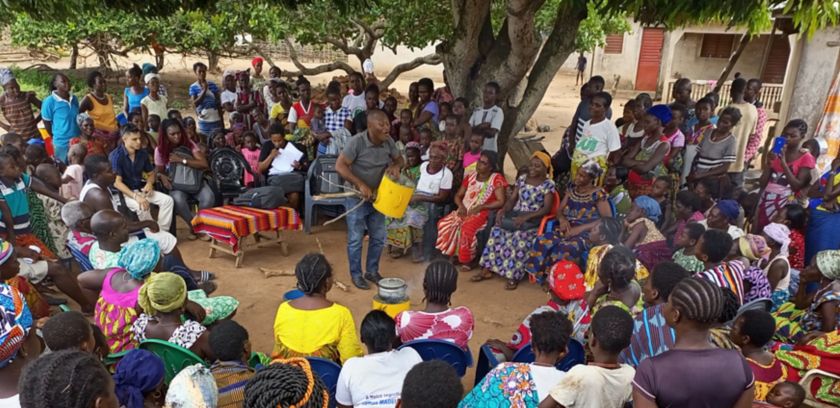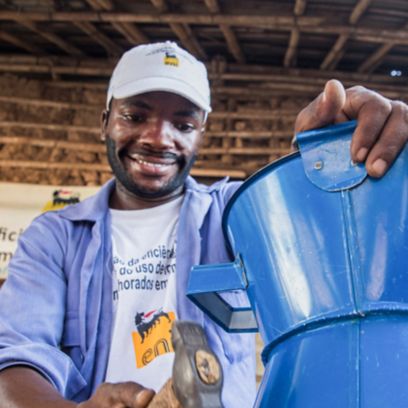- SUSTAINABILITY
- ACTIVITIES AROUND THE WORLD
- NET ZERO

Eni’s Clean Cooking Programme
In 2018 we launched our Clean Cooking Programme, a comprehensive project aimed at facilitating the transition from traditional cookstoves to more efficient models in sub-Saharan Africa. These improved cookstoves guarantee a reduction of over 60% in wood and charcoal consumption, allowing us to significantly cut the carbon footprint associated with cooking activities, while improving the quality of life for the families involved. In fact, the use of improved cookstoves entails benefits in terms of health, productivity, gender equality, forest and biodiversity conservation, and emissions reduction.
Eni has voluntarily set the objective of reaching 10 million people across sub-Saharan Africa by 2027. Furthermore, Eni intends to encourage the transition from improved cookstoves to advanced solutions, which zero the use of unsustainable woody biomass. Following this evolution, the goal is to reach 20 million people by 2030, with an associate spending of 300 million dollars.
Clean Cooking is a pillar of Eni’s effort to contribute to improving living standards in Sub-Saharan Africa; for this reason, Eni endorsed the “Clean Cooking Declaration: Making 2024 the pivotal year for Clean Cooking” promoted by the International Energy Agency (IEA) to accelerate universal access to more modern cooking systems. This is an essential step towards ensuring access to affordable, reliable, sustainable and modern energy for all, as established by the United Nations Sustainable Development Goal 7.
Besides improving access to energy, clean cooking projects contribute to reducing the production of charcoal and the direct use of firewood, major drivers of deforestation in many African countries. In addition, the production and distribution of these improved cookstoves fosters entrepreneurship and strengthens local economies, as they are produced and distributed locally, in collaboration with national and international organisations already working in the region. The entire project adopts a gender perspective: gathering wood is a time-consuming and tiresome task traditionally entrusted to women; the adoption of Clean Cooking systems frees up time for more productive or educational pursuits. Finally, there are further positive impacts on health, as the new cookstoves produce less smoke.
Nearly 2.3 billion people currently use traditional biomass for cooking, of which 1 billion in sub-Saharan Africa1. We aim to reduce the use of unsustainable wood fuels prevalent across the continent, where meals are cooked over open fires or rudimentary cookstoves, exposing people to harmful smoke from the burning of coal, charcoal and other products and materials linked to unsustainable supply chains.
Eni’s Clean Cooking initiatives gathered new impetus with the launch of the distribution of improved cookstoves in Côte d'Ivoire in 2022. In 2023, we launched a new phase of our “Promoting Energy Efficiency and Clean Cooking” project. In Mozambique we target 1.5 million people in the outskirts of Maputo and two central provinces of the country. In this context, the Clean Cooking initiative leveraged five small local companies for the production of cookstoves, which were used by over 100,000 people.
In 2024, we launched the programme to promote access to more efficient and safer cooking solutions for families also in Angola. The project, which has already involved 50,000 people, aims to reach over 2 million people by 2030.
From 2025, we will also begin to distributing advanced stoves that will allow to eliminate the use of woody biomass: for example, induction stoves in urban areas and gasifier cookstoves in rural areas. At the same time, we will promote the use of agricultural waste as an alternative sustainable fuel. This waste is the result of the processing of residual agricultural biomass, and will also come from our agricultural feedstock chain. This fuel will avoid the combustion of unsustainable woody biomass. To accelerate their adoption, we are planning to launch five pilot projects in the cities of Maputo and Beira (Mozambique), Pointe-Noire (Republic of Congo), Kigali (Rwanda) and Boakè (Côte d'Ivoire).
Notes:
1) International Energy Agency (IEA) data
The project's figures
Project objectives in Côte d'Ivoire, Mozambique, Rwanda, Angola and the Republic of Congo.
to be launched in Africa for the adoption of advanced stoves
will benefit from the program by 2027
will benefit from the program by 2030
already reached by the Clean Cooking Programme
estimated to be reached in the Republic of Congo
estimated to be reached in Mozambique
estimated to be reached in Ivory Coast
estimated to be reached in Rwanda
estimated to be reached in Angola
to be launched in Africa for the adoption of advanced stoves
will benefit from the program by 2027
will benefit from the program by 2030
already reached by the Clean Cooking Programme
estimated to be reached in the Republic of Congo
estimated to be reached in Mozambique
estimated to be reached in Ivory Coast
estimated to be reached in Rwanda
estimated to be reached in Angola
Our Clean Cooking projects in Africa

The improved cookstoves project in Côte d'Ivoire
The spread of improved cooking systems in the most vulnerable communities provides significant support against deforestation.

The project supporting sustainable cooking in Mozambique
We contribute to improving the quality of life of the households involved in the initiative and support local businesses.
The Joint Statement on Clean Cooking
Eni’s Clean Cooking Programme is part of a broader global context. The Sustainable Development Goal 7 of the United Nations 2030 Agenda (SDG 7) aims to "ensure access to affordable, reliable, sustainable and modern energy systems for all", and within this framework, the International Energy Agency (IEA) highlights the importance of Clean Cooking initiatives. Particularly in African countries, lack of access to clean cooking has direct health, climate and gender implications, contributing to 3.7 million premature deaths of women and children each year in Africa alone. It is estimated that an annual investment of around 4 billion dollars would be needed to ensure access to Clean Cooking for the entire African population by 2030.
In line with these objectives, in May 2024 Eni endorsed the Clean Cooking Declaration: Making 2024 the pivotal year for Clean Cooking during the Summit on Clean Cooking in Africa promoted by the International Energy Agency (IEA). The event, held at the UNESCO headquarters in Paris, brought together heads of state and government, business leaders and representatives of international institutions and civil society from around the world to shed light on the issue. Participants shared insights into the needs and ongoing initiatives in Africa, with the aim of implementing supportive actions and identifying 2024 as a crucial year for accelerating universal access to Clean Cooking.

































